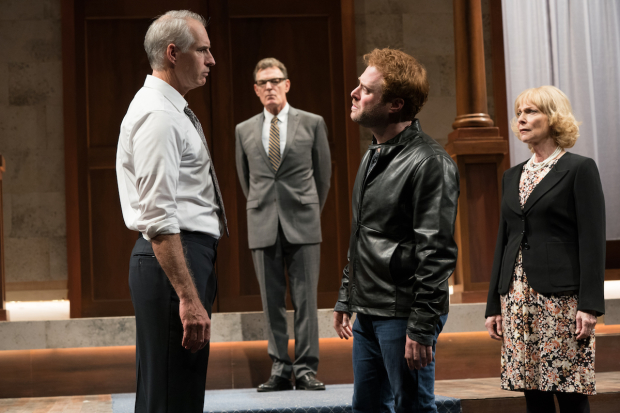King Charles III

(© Jenny Graham)
Mike Bartlett's award-winning play King Charles III arrives at the Pasadena Playhouse with a reinterpretation by its director, Michael Michetti, putting his own touch on the production. A talented cast enlivens this "what if" that finds the new monarch, King Charles III (Jim Abele), clashing with a hostile parliament.
Queen Elizabeth II has passed away, and for the first time, Charles has achieved his manifest destiny as ruling leader of the U.K. and its territories. Almost immediately, he discovers that his prime minister and parliament have no respect for his constitutional right to advise and consent. A troubling freedom of the press restriction bill has been rushed through government and despite Charles's concern for striking down one of free society's most sacred tenets, the P.M. (J. Paul Boehmer) railroads the new king into signing or facing treacherous consequences. The king finds himself alone, with his son Harry (Dylan Saunders) caught up in his own domestic drama, his heir William (Adam Haas Hunter) wedged between duty and ambition, and his daughter-in-law Kate (Meghan Andrews) scheming in the background like a sorority sister Lady Macbeth. Charles sticks to his principles but seems to be a pawn rather than a monarch.
Abele represents Charles's regality and madness seamlessly. His righteousness shines, as does his adoration for his sons and allegiance to duty. Saunders (as Prince Harry) and Hunter (as Prince William) are perfectly cast. Hunter feels like a ping-pong ball, being darted around by overly ambitious consiglieres, almost on the verge of tears from frustration. Saunders, who has palpable chemistry with his character's lover (Sarah Hollis), conveys all the restlessness of always being The Man Who'll NEVER Be King. Andrews does an excellent job of smoothing out Kate's edges. She appears more passionate about saving her husband's legacy than just surreptitiously grabbing at power. Still duplicitous, she brings civility to her machinations. Boehmer is able to do little but look haughty and menacingly cruel as the prime minister. Partially the fault of the script, he reads more like a cartoon villain from Rocky and Bullwinkle.
Shakespearean in its ambitions and aspirations, King Charles III pays homage to the Bard's famous tragedies and historical pageants. Thematically, the plot is reminiscent of Shakespeare's classics, particularly King Lear and Macbeth. Bartlett mixes humor with the play's more tense moments. Just as the Bard juxtaposed blank verse with prose, Bartlett has the monarchy and government speak in iambic pentameter with Harry and his friends dialoguing like they're on the streets of London. Once Harry pledges allegiance to his new king and accepts his place in the court, he too speaks in verse. The play does have plot contrivances that rankle. The topic of freedom of the press is so fundamental that the author appears to take definitive sides on who's a hero and who's a villain. Throughout the play, the king appears to be an island with enemies at every side.
Michetti stages the actors with aplomb, treating them as pieces on a chessboard. Peter Bayne's original music lends a Gothic tension to the mood, aided by the Pasadena Master Chorale, but having the actors mouth the words of the choral song looks sloppy and unnecessary. Alex Jaeger's costumes, particularly the dresses for the coronation and Charles in his full regalia, are striking. David Meyer's faux-wood and marble set with noble columns and platforms that lead out to the audience simulates a palace in an effectively abstract way.
Interestingly enough, King Charles III could not be a timelier wake-up call for our tumbling media-obsessed country, with a leader that cares more about headlines than the truth. If our safeguards do not protect us as they've been staffed to do, the United States also could fall into chaos like the imaginary U.K. of this vital play.










